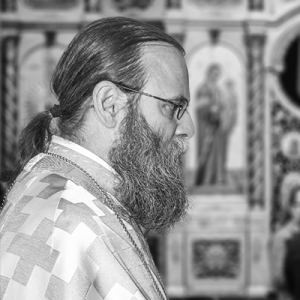“Walking the Talk” — Spiritual Reading, Part I
— Fr. Bohdan Hladio
November 2008 A.D.
Holy Scripture
We live in an age of almost universal literacy. Paradoxically Biblical literacy – knowledge of the Bible – is probably at one of its lowest points in history. Even among those who call themselves Christians.
A student cannot succeed if they don’t do their homework. It’s impossible for any professional – doctor, lawyer, teacher, even most “blue collar” workers – to maintain their employment or accreditation without regular upgrading. Life-long education isn’t only important for students or employees, it’s essential for Christians as well.
The primary “text book” of every Christian is the Bible – with the New Testament in general and the Gospels in particular forming the most vital part thereof. Anyone who claims to be a Christian should have a daily regimen of spiritual reading, encompassing both Holy Scripture and works of spiritual edification.
How should we read the Bible? Reading the Bible from cover to cover is not recommended. The Gospels are the heart of the Bible, followed in order of importance by the Epistles and Psalter, the books of Genesis, Proverbs, and Isaiah (which are read liturgically during Lent), and the rest of Scripture.
Daily Bible reading should include a passage from the Gospels and a passage from an Epistle. The readings given in the lectionary (found in the Church calendar) are ideal for this. It is generally more beneficial to read a short passage attentively every day rather than a long section once or twice a week. Daily reading of the Psalms – anything from a minimum of one psalm to an entire kathisma (section) – is also highly encouraged.
Father Alexander Elchaninov offers the following advice in regards to the reading of Scripture:
“You are unsuccessful in your reading of the Gospels, because, in the first place, you lack sufficient imagination. The words of the Gospels do not give you a vivid image of Christ; in order to obtain it, you need to make a real effort of your own. Secondly, you do not love Christ enough, or else with the greatest eagerness you would read over and over again this, the one and only book that testifies to Him, and you would never stop discovering new details and shades of meaning in it.
There are two ways of reading the Gospels:
- To read very little at a time – a verse or two – then to read them over again, reflecting on them all day long, considering them as words of Christ addressed to you personally.
- When you know the Gospels well, to read large portions of them (one Evangelist at a time, or all four together), in order to grasp the sequence of events and the general spirit. If you have a weak memory, this is a great help: indeed, it is even essential.”
While it is important, as Fr. Alexander notes, to read the Gospel with imagination, understanding it to be a living document addressed in some mysterious way to each one of us personally, we must at the same time heed these words of St. Peter:
“No prophecy of Scripture is of any private interpretation, for prophecy never came by the will of man, but holy men of God spoke as they were moved by the Holy Spirit.” (II Pet. 1:20)
We must avoid the temptation to apply purely personal interpretations to anything that we read in Scripture (it is the folly and hubris of giving in to this temptation that has resulted in the existence of over 20,000 different Protestant bodies in the world today!).
Like the eunuch of Queen Candace (Acts 8:31) we admit that we cannot interpret scripture without help from others, more knowledgeable and holy than ourselves. When reading the Bible it is essential and beneficial to refer to biblical commentaries by the fathers and the saints of the Church, especially when we encounter difficult or ambiguous passages. Two excellent resources for this are The Bible and Holy Fathers for Orthodox by Joanna Manley, and The Orthodox Study Bible. Simply put, one of these two books should be the fundamental text used for daily reading by Orthodox faithful.
We must also be sure that when we read the Bible we are actually reading the Bible. Many different translations of the Bible are available, some good, some sacrilegious, some not translations at all. The New King James version (used in the two books cited earlier), the Revised Standard Version (not the New RSV), and the King James version are the safest English translations to use. When reading the Old Testament we should only use the Septuagint text, as this is the “Christian Old Testament”. The new edition of the Orthodox Study Bible which includes the Septuagint text of the Old Testament is an excellent resource, and should be found – and read! – in every Orthodox home.
Finally, when reading scripture, we must always ask ourselves, “How does this apply to me personally? What is God trying to teach me? How can I apply this lesson in my life?” We will not be able to even hear God’s word unless we are willing to fulfill it. (cf. Ps. 102: 17-18).
The daily reading of Holy Scripture is an essential element in the life of every Christian. How much time do I spend every day watching TV or films, reading newspapers, magazines, books, or listening to music? None of us has an excuse to not make daily personal study of Scripture a priority.

